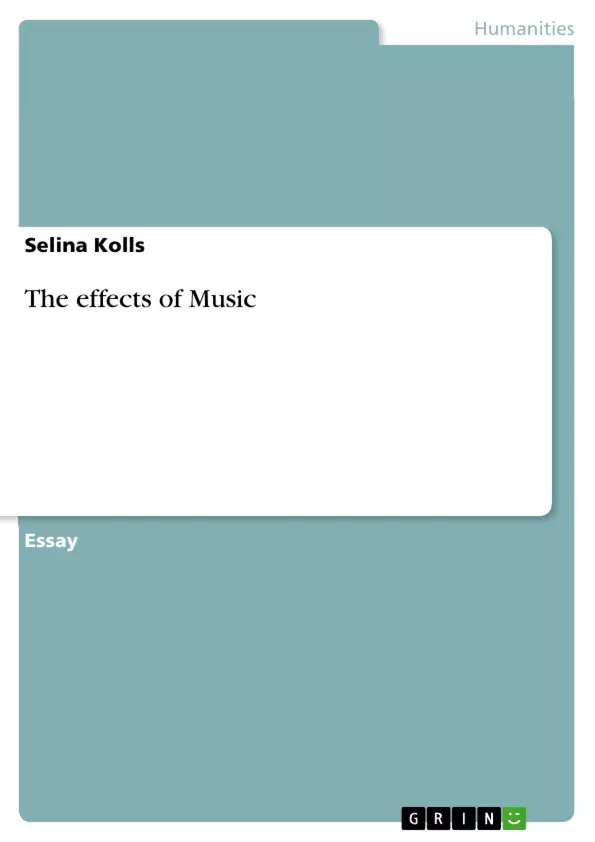The text is a short analysis of the impact of music on human nature.
Music has been part of man since time immemorial. Music has many impacts on human nature and defines man in different ways. Movies and music have been working together for a long time and the latter plays a significant role in filmmaking. It has prominently featured in movies because it affects our emotions; it can make one cry, laugh or can even scare. Scientific findings show that music affects the auditory cortex which handles sound in the brain and the emotion center. Therefore, music improves memory and accelerates brain function and in return, helps the audience to memorize the film for a long time. It also enables the audience to absorb more from the movie. The research conducted from the drama “The Memory Dealer,” shows that music in the film has so many effects.
Inhaltsverzeichnis (Table of Contents)
- Effects of Music on Video Production
- The Role of Music in Filmmaking
- Music's Impact on Emotions
- Music and Memory
- Music's Influence on Actors
- Music and the Unconscious Mind
- Music's Influence on Behavior and Attitudes
- Music and Realism in Film
- Music in Advertisements
- The Use of Music to Evoke Emotions
- Rules for Setting Music in Film
- Music and Foreshadowing
- Music for Accompaniment
- The Power of Music in Film
- Music as a Communication Link
- Music and the Visual Experience
- The Importance of Music in Film
Zielsetzung und Themenschwerpunkte (Objectives and Key Themes)
This paper examines the significant role of music in video production, exploring its impact on viewers' emotions, memory, and overall engagement with the film. It delves into the ways music influences actors' performances, enhances realism, and creates a powerful communication link between the audience and the screen.
- The impact of music on emotions and memory
- The role of music in enhancing realism and narrative engagement
- The use of music to influence actors' performances and viewer behavior
- The importance of music as a communication link between the audience and the screen
- The interplay of music and visual elements in creating a compelling cinematic experience
Zusammenfassung der Kapitel (Chapter Summaries)
The paper begins by establishing the long-standing connection between music and film, highlighting its capacity to evoke a wide range of emotions. It then explores the scientific evidence suggesting that music affects the brain's auditory cortex and emotional center, ultimately enhancing memory and engagement with the film. The paper further examines the impact of music on actors, demonstrating how it can influence their confidence, performance, and understanding of their roles. It delves into the subconscious nature of music's influence, arguing that its power lies in its ability to evoke feelings, memories, and thoughts, regardless of conscious understanding.
The paper also explores the role of music in shaping viewer behavior and attitudes, highlighting its ability to create a sense of realism and immersion. It discusses the use of music in advertisements and its parallels to how music influences audience perception of characters in film. The paper then analyzes the techniques employed by film composers to evoke specific emotions through music, emphasizing the importance of considering the overall tone and context of the scene. It delves into the use of music for foreshadowing and accompaniment, highlighting the ways these techniques build suspense, tension, and emotional resonance.
The paper concludes by emphasizing the power of music as a communication link between the audience and the screen, arguing that it intensifies the inner thoughts of characters and provides a deeper understanding of their motivations and actions. It underscores the importance of music as an integral component of the visual experience, highlighting its capacity to enhance the emotional and narrative impact of film.
Schlüsselwörter (Keywords)
The key themes and concepts explored in this paper include the impact of music on emotions, memory, and viewer engagement; the role of music in enhancing realism and creating a powerful communication link between the audience and the screen; the interplay of music and visual elements in creating a compelling cinematic experience; and the use of music to influence actors' performances and viewer behavior.
Frequently Asked Questions
What is the primary focus of this paper on music?
The paper analyzes the impact of music on human nature, specifically focusing on its role in video production and filmmaking.
How does music affect the human brain?
Scientific findings show that music affects the auditory cortex and the emotion center of the brain, improving memory and accelerating brain function.
What role does music play in movies?
Music is used to evoke emotions, enhance realism, provide foreshadowing, and create a communication link between the audience and the screen.
Does music influence the actors in a film?
Yes, the paper examines how music can influence actors' performances, confidence, and their understanding of their roles.
What case study is mentioned in the research?
The research references findings from the drama "The Memory Dealer" to show the various effects of music in film.
Is the use of music in advertisements covered?
Yes, the paper discusses the role of music in advertisements and how it parallels the influence of music on character perception in films.
- Quote paper
- Selina Kolls (Author), 2001, The effects of Music, Munich, GRIN Verlag, https://www.grin.com/document/341446



